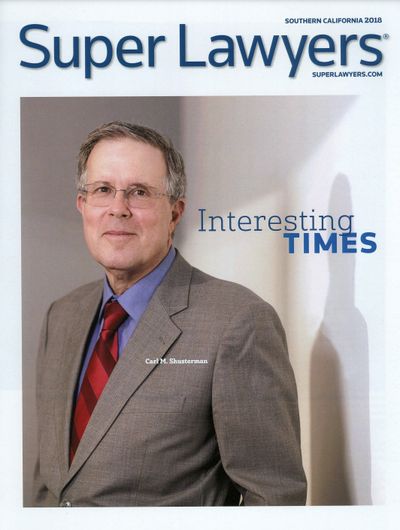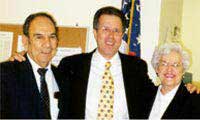
Persons who have accumulated 180 days or more of UP after April 1, 1997, and have then left the country, cannot return to the US for 3 years. Persons who have accumulated one year or more of UP after April 1, 1997, and have then left the country, cannot return to the US for 10 years. Persons who illegally return to the US without seeking a waiver must wait outside the US for a period of 10 years before they can apply for a waiver. The same rule applies to persons who illegally reenter the US after being deported.
On June 24, 2022, USCIS issued policy guidance whereby a noncitizen who again seeks admission more than 3 or 10 years after departure or removal is not inadmissible under INA 212(a)(9)(B), even if the noncitizen returned to the U.S., with or without authorization, during the statutory 3-year or 10-year period.
Client Reviews

It Was Worth Every Penny
“Our experience with the Law Offices of Carl Shusterman began with a phone conference with Mr. Shusterman himself, which lasted about an hour. We were assigned to the team of Attorney Jennifer Rozdzielski and Ana Cruz. The situation was not an easy one, and it took about three years and a myriad of paperwork to resolve. We got to know both Jennifer and Ana very well in the process. They stayed positive and kept us on track with all the papers and forms and documentation required. I have to say that we were treated like family, and they were excited when we finally achieved our dreams. We are so glad we chose them – it was worth every penny!!”
- James Baker, Portland, Oregon
Read More Reviews
Zoom Consultations Available!
A person can accumulate UP by (1) entering the US without inspection; (2) by overstaying the expiration date on his I-94; or (3) by violating his status if he is notified by the government that he has done so.
A waiver may be obtained by submitting Form I-601 to the USCIS and demonstrating that the person’s US citizen or permanent resident spouse or parent(s) would suffer “extreme hardship” unless the person was granted a waiver.
In 2013, it became possible to obtain an I-601A provisional waiver within the US. A 2016 rule expanded the qualifying relatives needed in order to apply for a provisional waiver.
We hope that the materials linked to below help you to better understand both concepts.
Unlawful Presence & Waivers is divided into the following subsections:
Related pages:
SUCCESS STORIES
- Saving Our Client from the 10 Year Bar
- Demonstrating Extreme Hardship
- Green Card Through Hardship
- Reuniting a Family through an I-212 Waiver
- Obtaining a Non-Immigrant Visa Waiver
- Extreme Hardship Waiver Brings Dog Trainer Home to His Pack
- Obtaining a Waiver for the Permanent Bar
- Immigration Judge Grants I-601 Fraud Waiver
- Reversing An Erroneous USCIS Decision
- Circumventing the Three-Year Bar
- Fraud Waiver and Managing Editor
VIDEOS – UNLAWFUL PRESENCE
- Unlawful Presence Bars and Waivers – Unlawful presence can complicate your return to the US, and applies to persons who: (1) entered the US without inspection; (2) overstayed their visa; or (3) violated their temporary visa status.
- I-601A Provisional Unlawful Presence Waivers – The Provisional Unlawful Presence Waiver (I-601A) allows certain persons to apply for waivers of unlawful presence in the US before going to their home countries for their green card interviews.
GENERAL INFORMATION – UNLAWFUL PRESENCE
- Unlawful Presence and Bars to Admissibility (USCIS)
- Three- and Ten-Year Re-Entry Bars – Policy Brief (3-23-23)
- INA 212(a)(9)(B) Policy Manual Guidance – USCIS (6-24-22)
- Duran Gonzalez v. DHS Settlement Q&A: Eligibility for Adjustment of Status Under Section 245(i) with I-212 Waiver (7-30-14)
- Policy Memo: Filing Exceptions for Form I-601 and Any Associated Form I-212 (6-13-12)
- USCIS: Centralized Filing for I-601 Waivers (6-4-12)
- Provisional Unlawful Presence Waivers of Inadmissibility for Certain Immediate Relatives – Proposed Rule (4-02-12)
- Immigrant Waivers: Procedures for Adjudication of Form I-601 For Overseas Adjudication Officers (USCIS)
- Consolidation of Guidance Concerning Unlawful Presence (5-6-09) – Supersedes Previous Memos
- USCIS Chief Counsel: 3 and 10 Year Bar Requirements May be Fulfilled in the U.S. (1-26-09)
- AAO: I-601 Waiver Victory – 10-year Bar (1-09-08)
- AAO: I-601 Waiver Victory – 10-year Bar (10-31-07)
- USCIS on Effect of Presence in the U.S. for Persons Paroled in Despite Being Subject to 212(a)(9)(B) Bar of Inadmissibility (7-14-06)
- Guidance on “Period of Stay Authorized by the Attorney General” in Determining “Unlawful Presence (4-02-03)
- INS Issues Foreign Travel Advisory For Aliens With Pending Immigration Applications (11-22-00)
- INS Memorandum: No Unlawful Presence During Pendency of Application for COS/EOS (3-3-00)
- INS General Counsel’s List of Resolved Issues (12-10-99)
- Unlawful Presence Hypothetical Questions and Answers
- DOS Cable Re: Unlawful Presence and Canadians
- INS Advises on Asylee Exception to Unlawful Presence (6-8-99)
- State Department Memo on Bars of Inadmissibility (4-4-98)
- State Department’s Cable (12-17-97)
- INS Memo on Adjustment of Status and Entitlement Bars (6-17-97)
What is Extreme Hardship?
- Extreme Hardship Considerations and Factors (USCIS)
- Matter of Anderson (BIA 1978)
- Matter of Lopez-Monzon (BIA 1979)
- Matter of L-O-G (BIA 1996)
Court Opinions and Decisions
- In Re Honorio TORRES-GARCIA, BIA (1-26-06) An alien who reenters the U.S. without admission after having previously been removed is inadmissible under the permanent bar.
- Duran-Gonzalez v. Homeland Security, U.S. Court of Appeals, Ninth Circuit (11-30-07) Adjustment of status under section 245(i) is not available to an alien who is inadmissible under the permanent bar.
- In re Miguel LEMUS-Losa, BIA (11-29-07) An alien who is unlawfully present in the U.S. for a period of 1 year, departs and then seeks admission within 10 years is inadmissible.
- In re Alonzo BRIONES, BIA (11-29-07) Adjustment of status under section 245(i) is not available to a person who is inadmissible under the permanent bar.
What Can We Help You With – Videos
Senate TestimonyGreen Cards Through Employment
Green Cards Through Marriage
View More Videos

